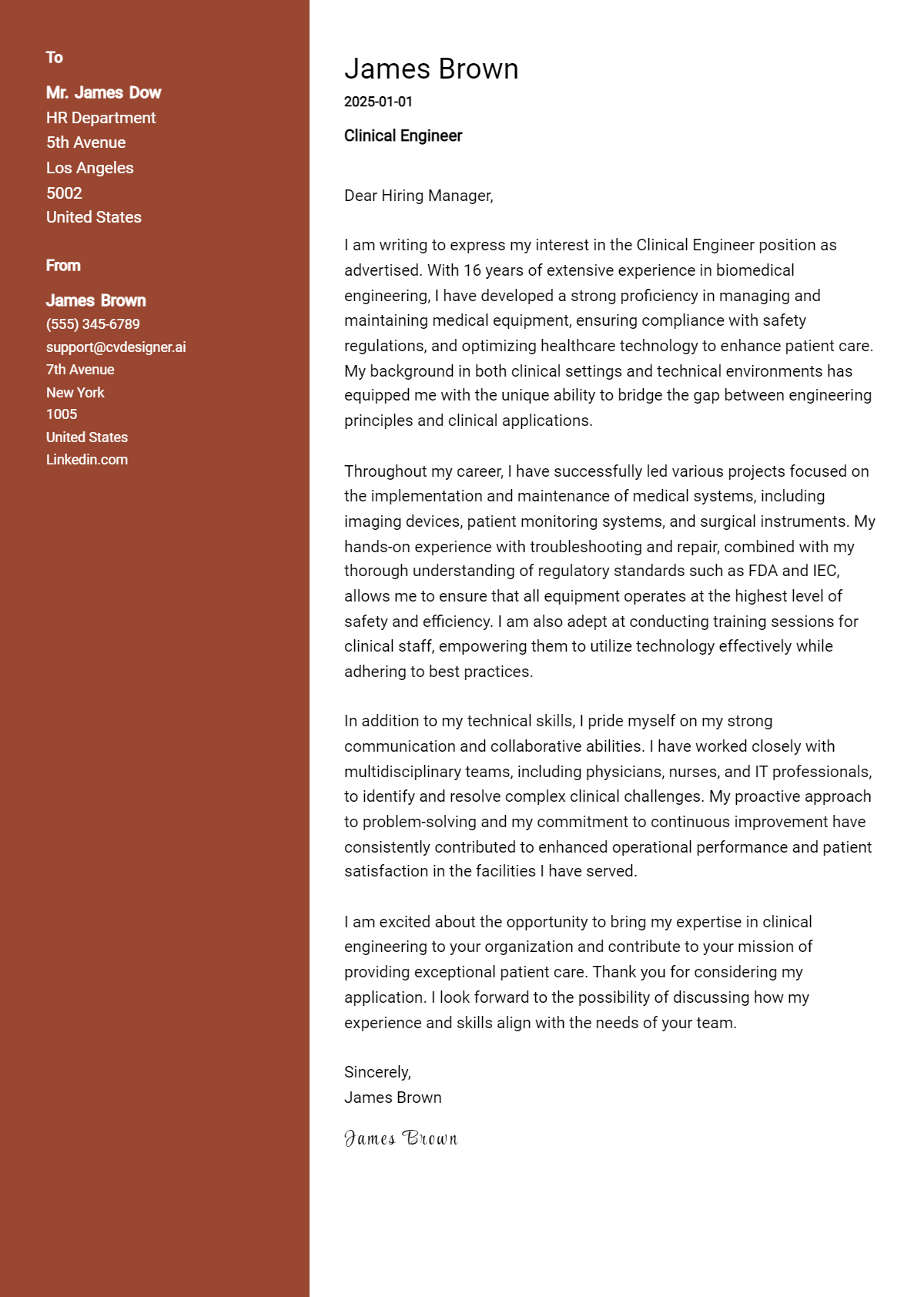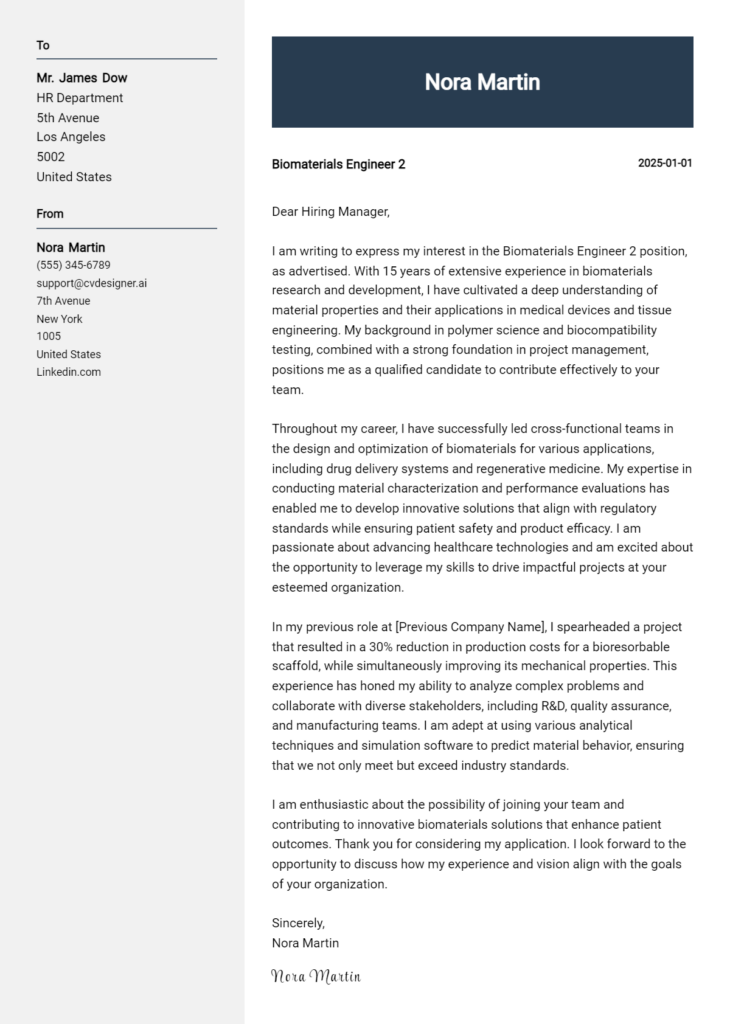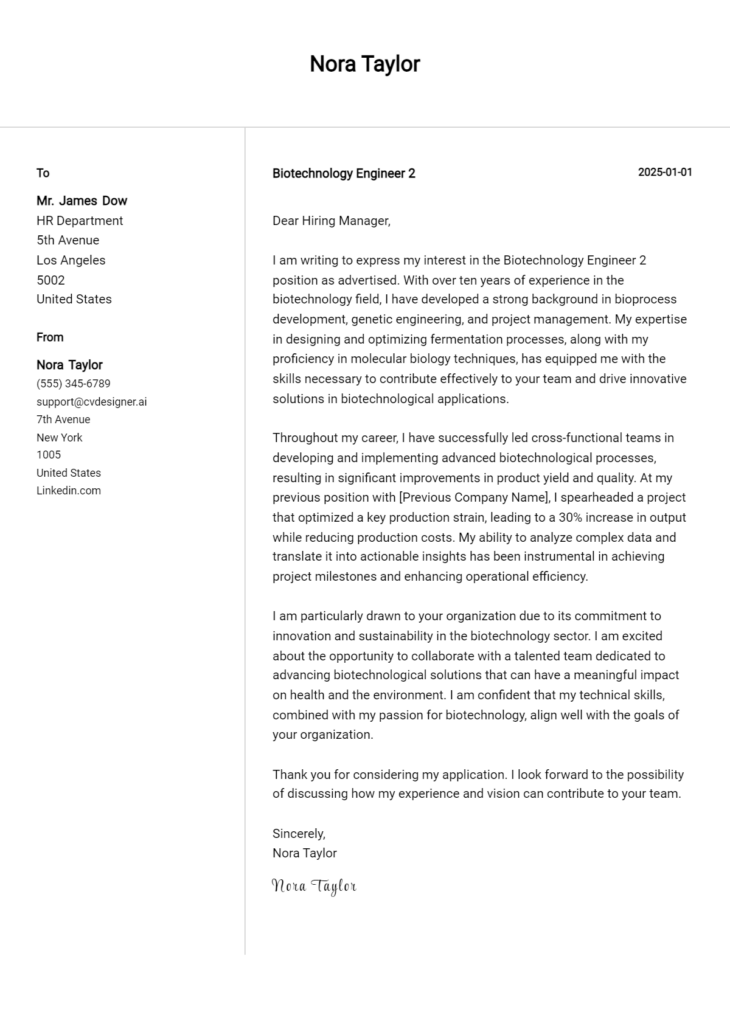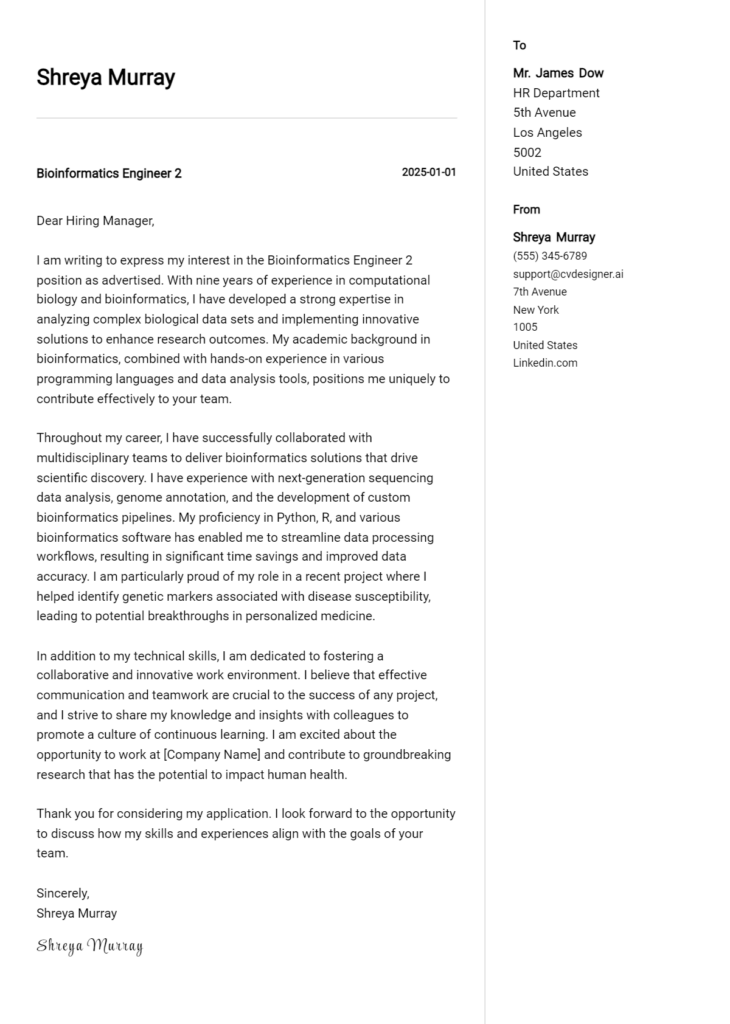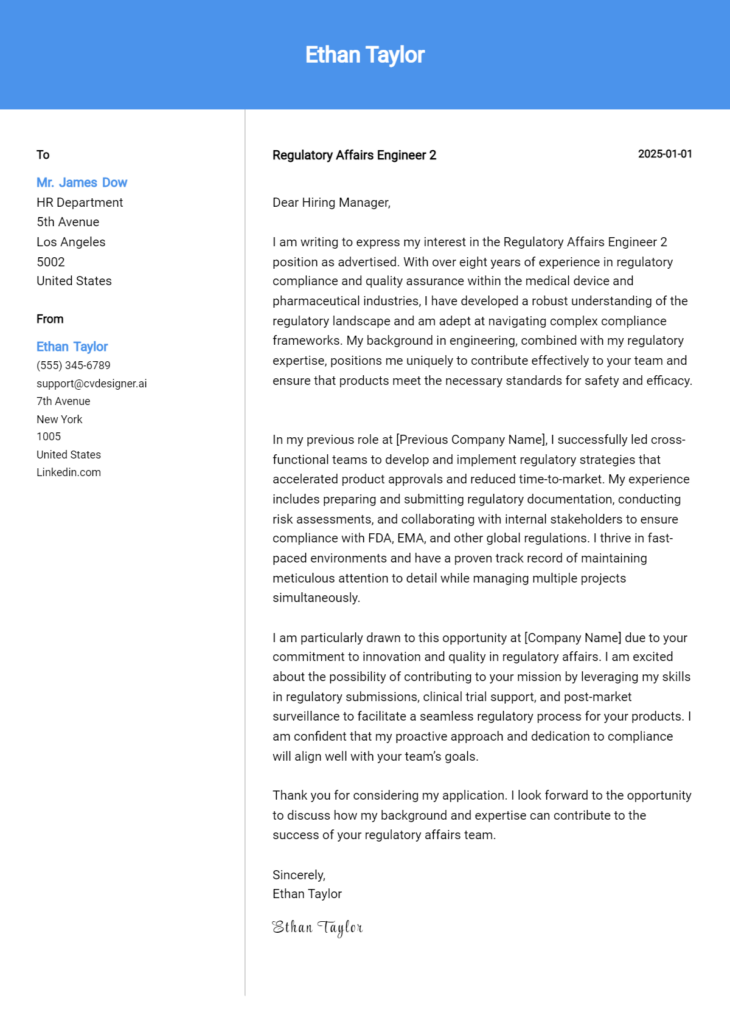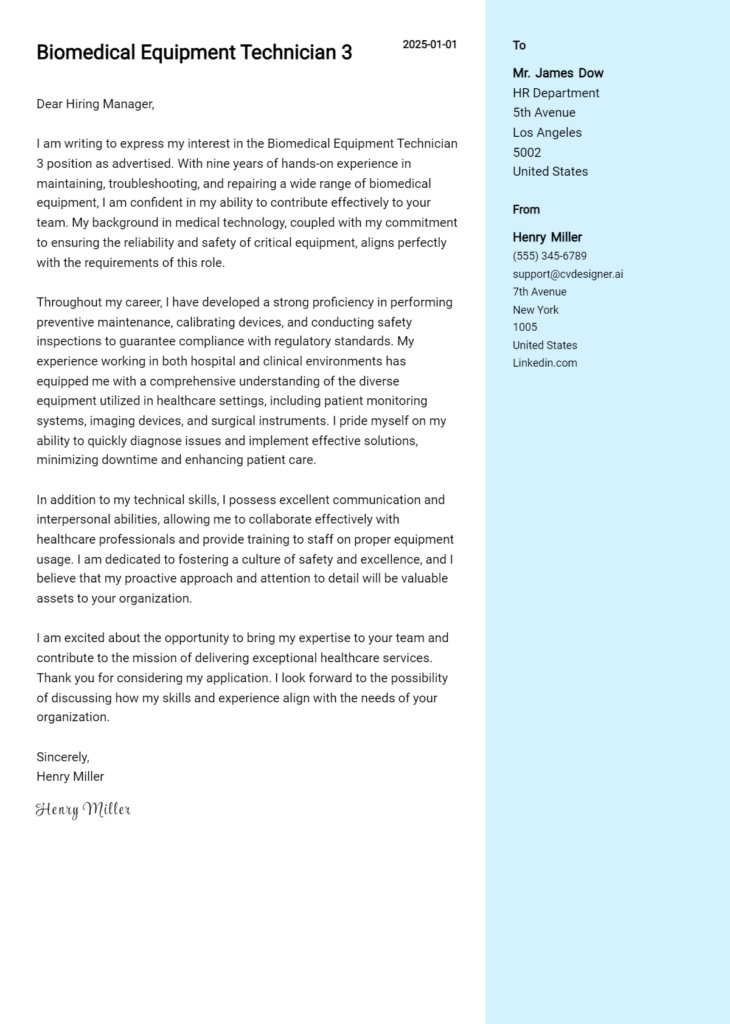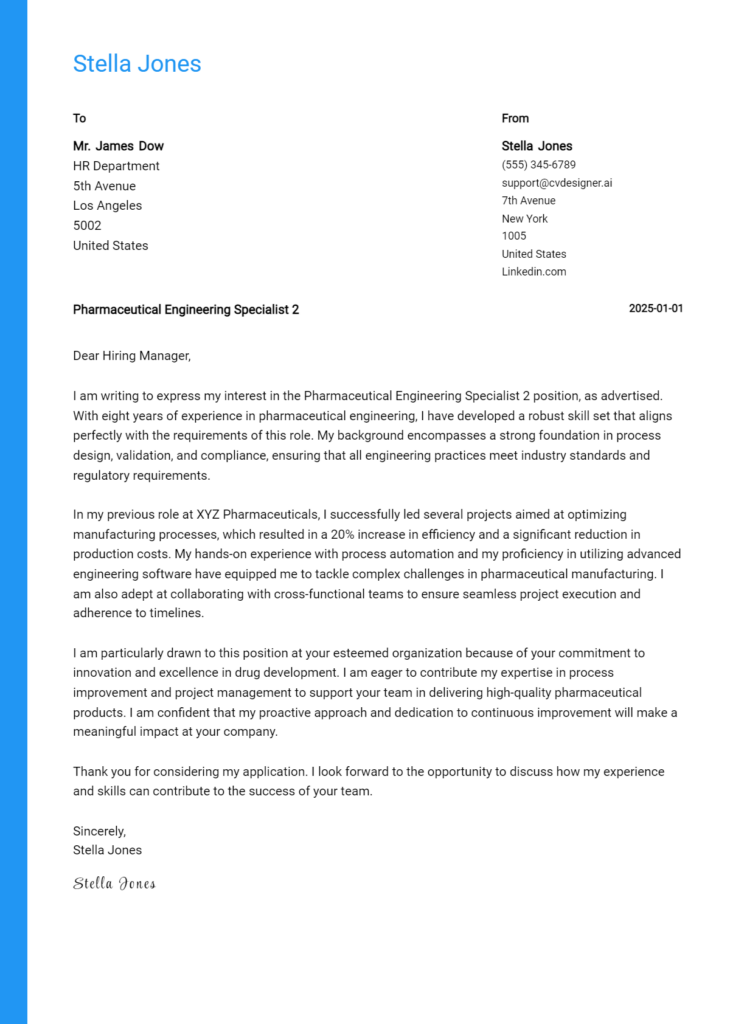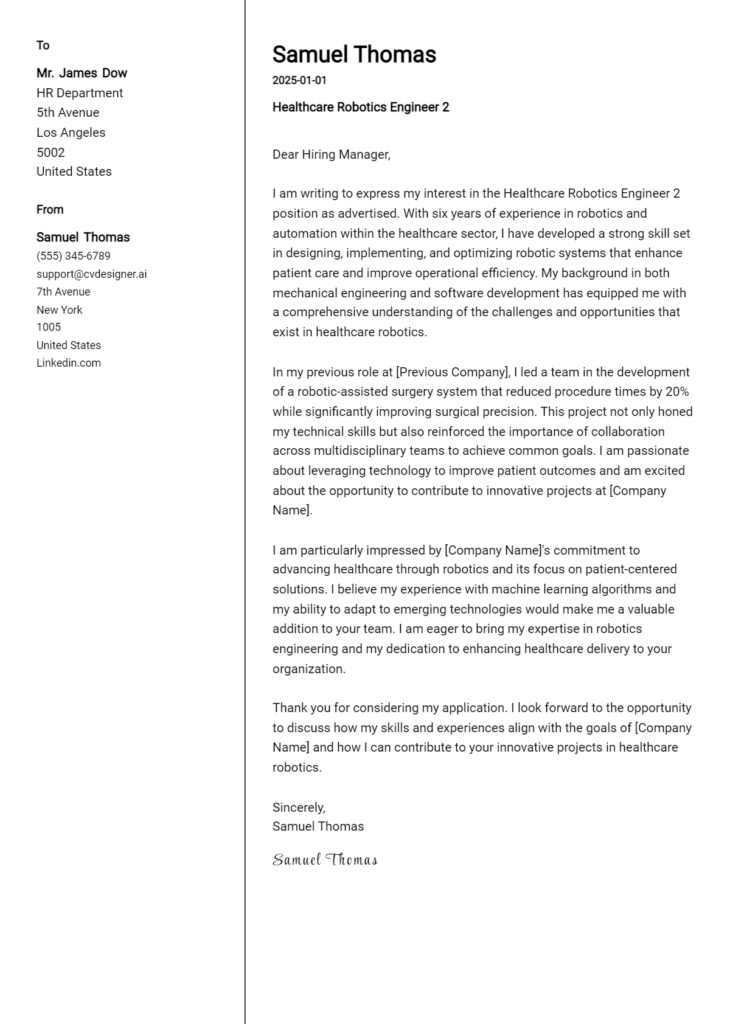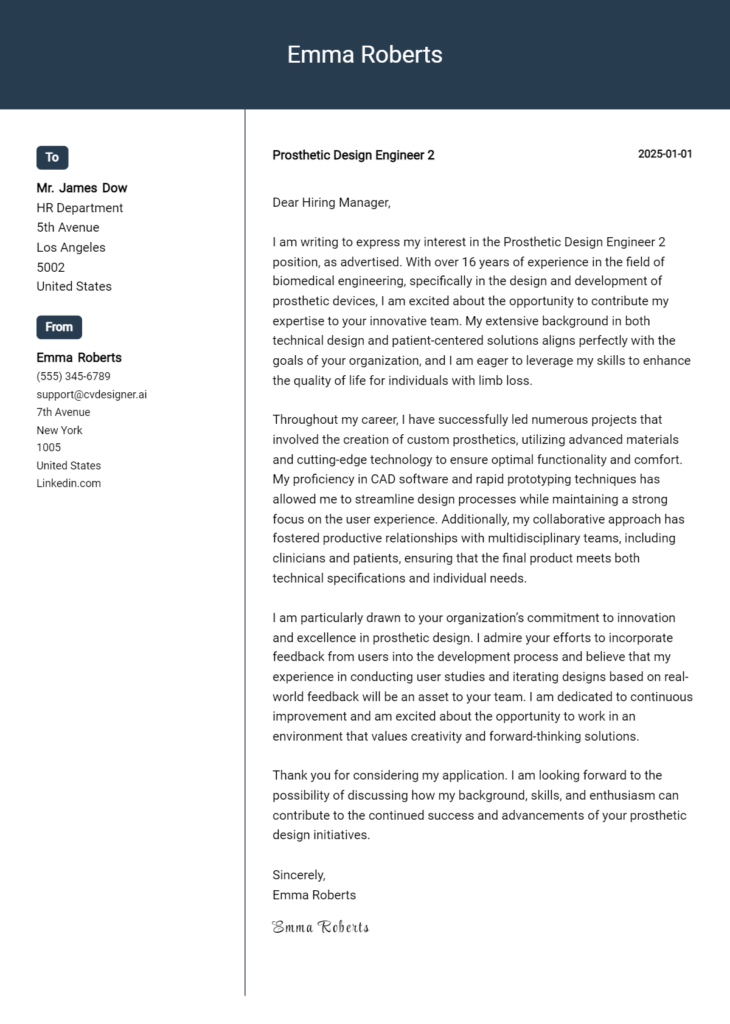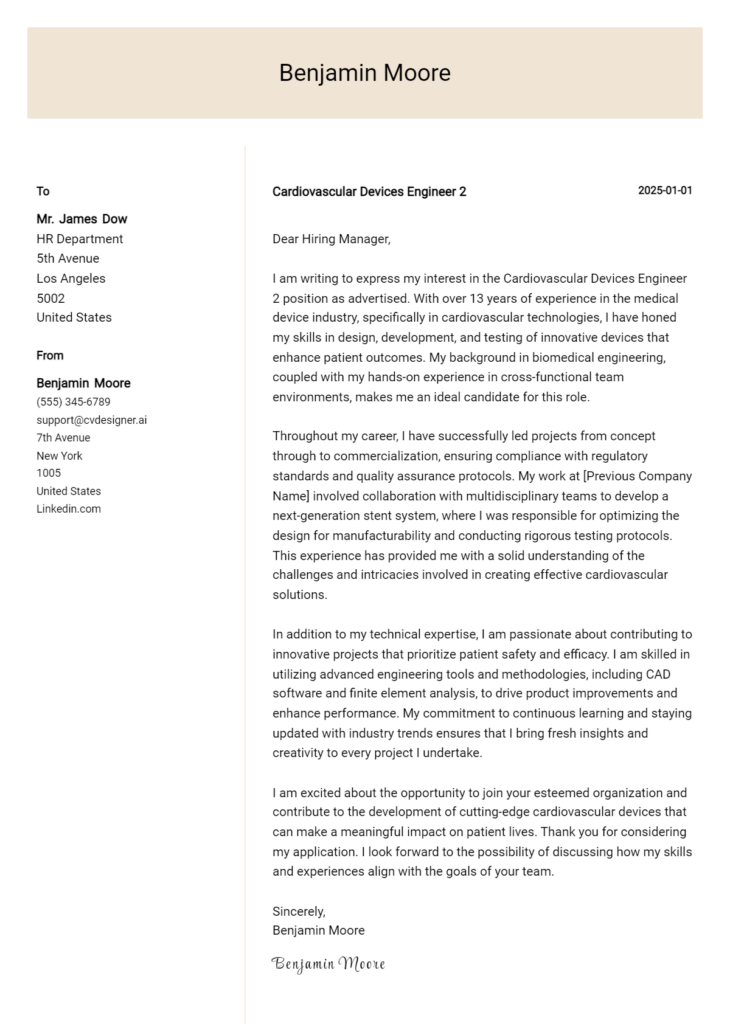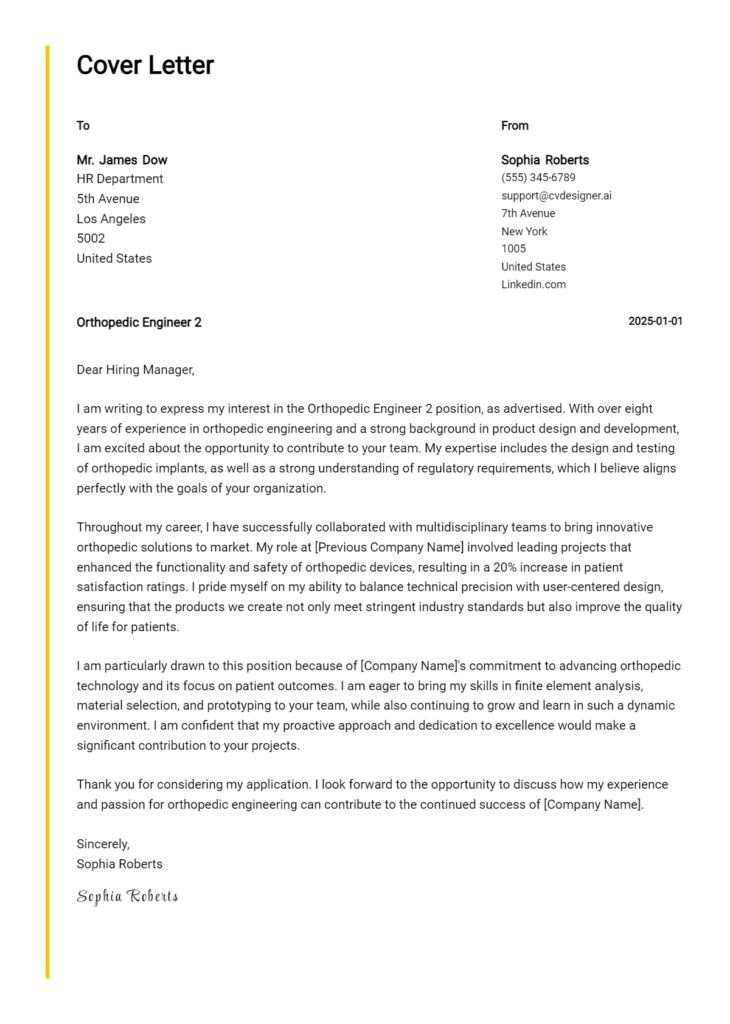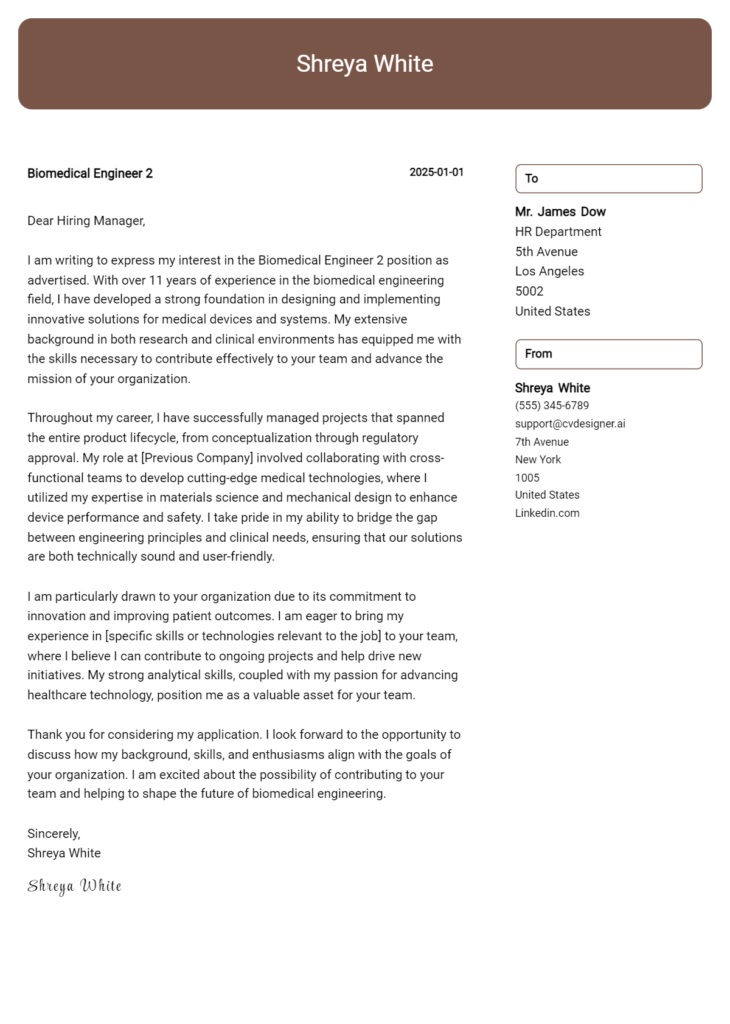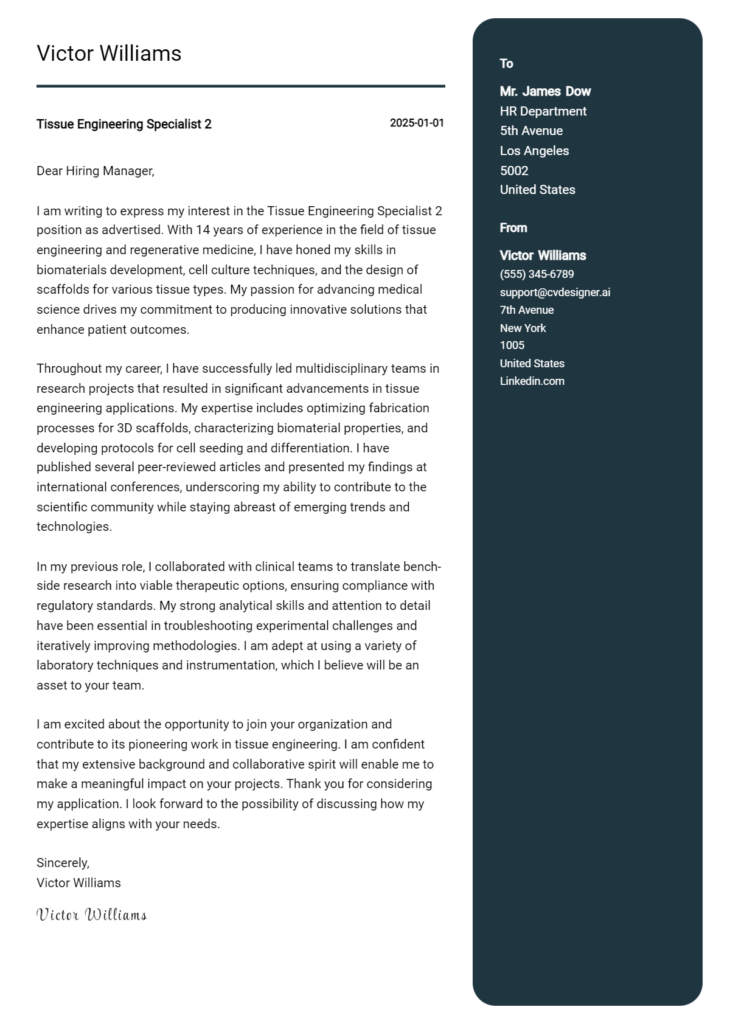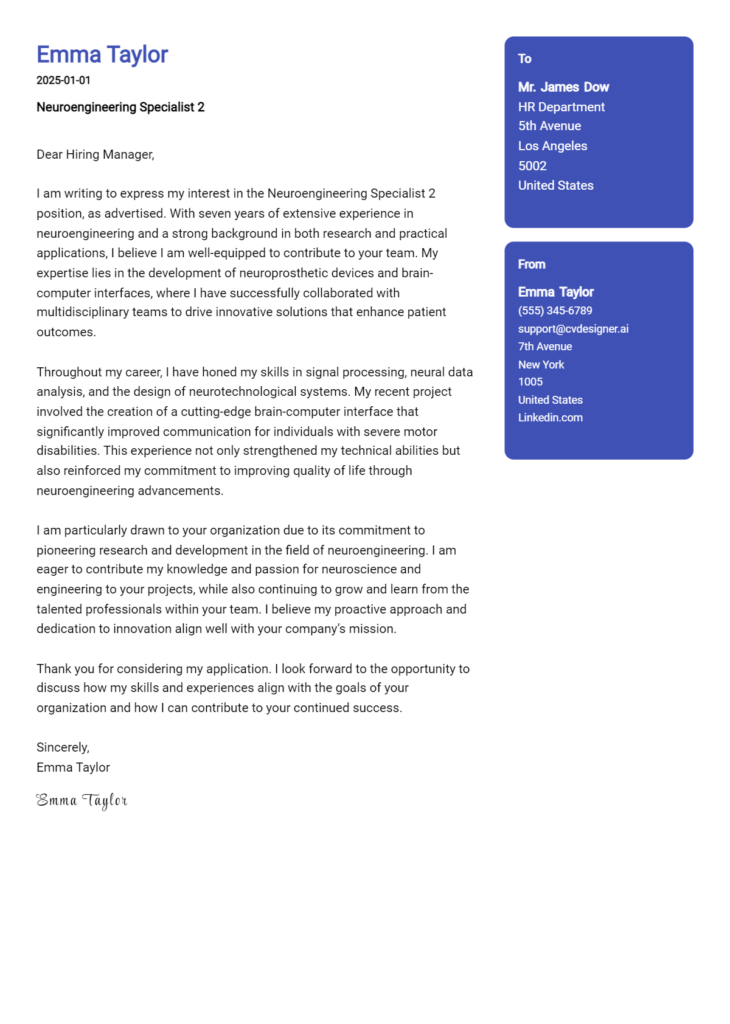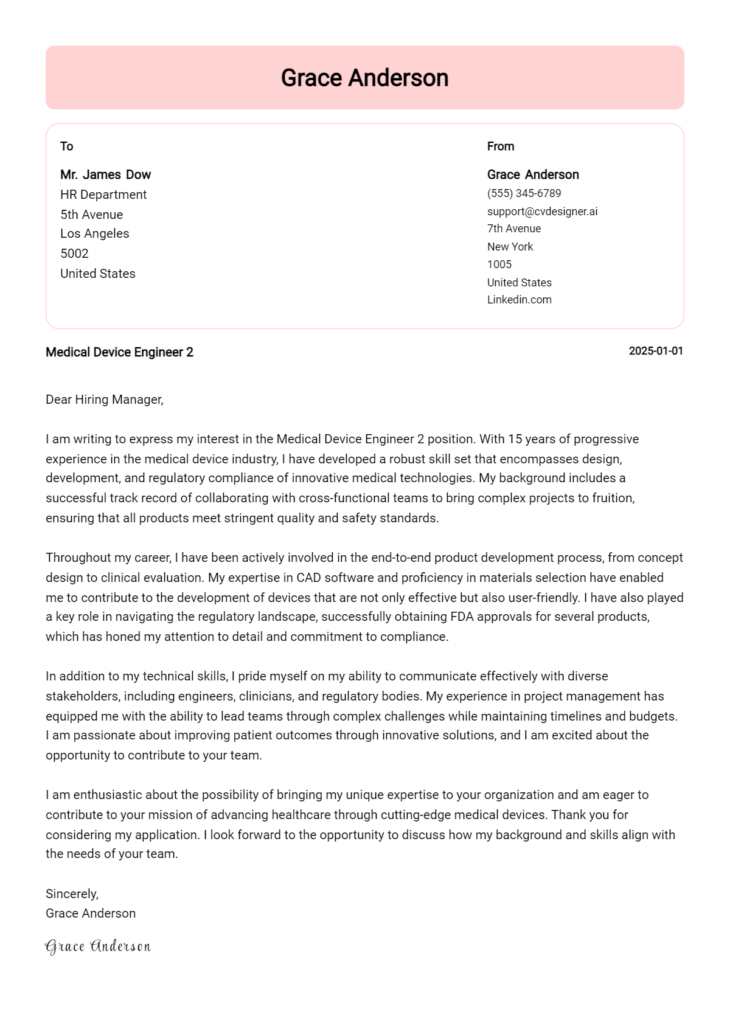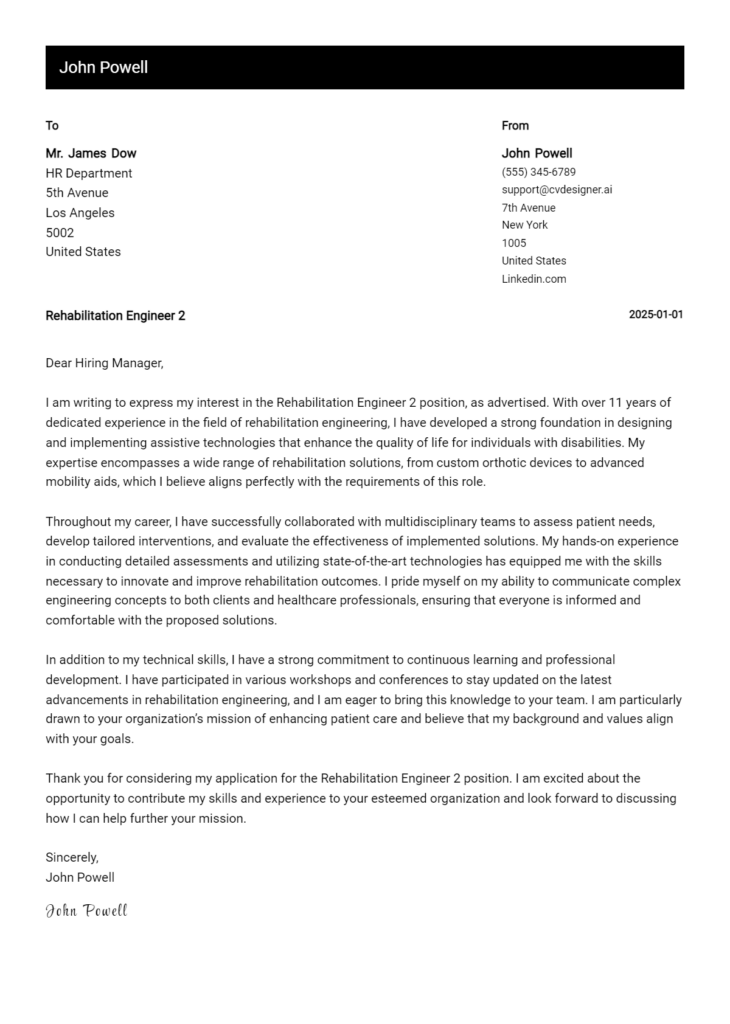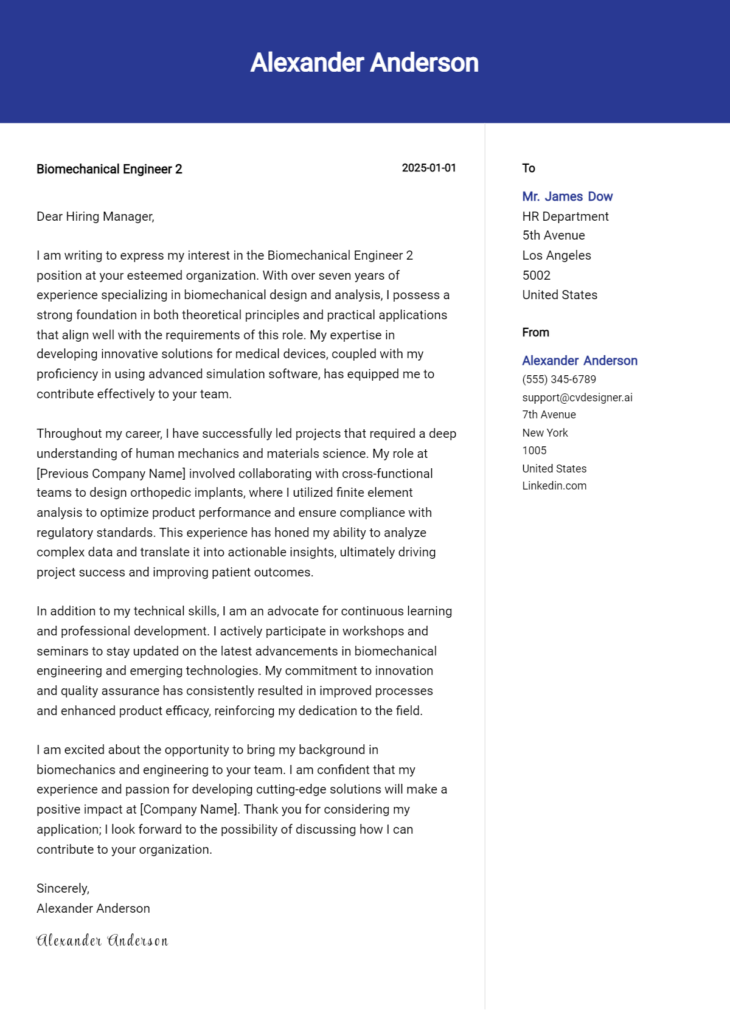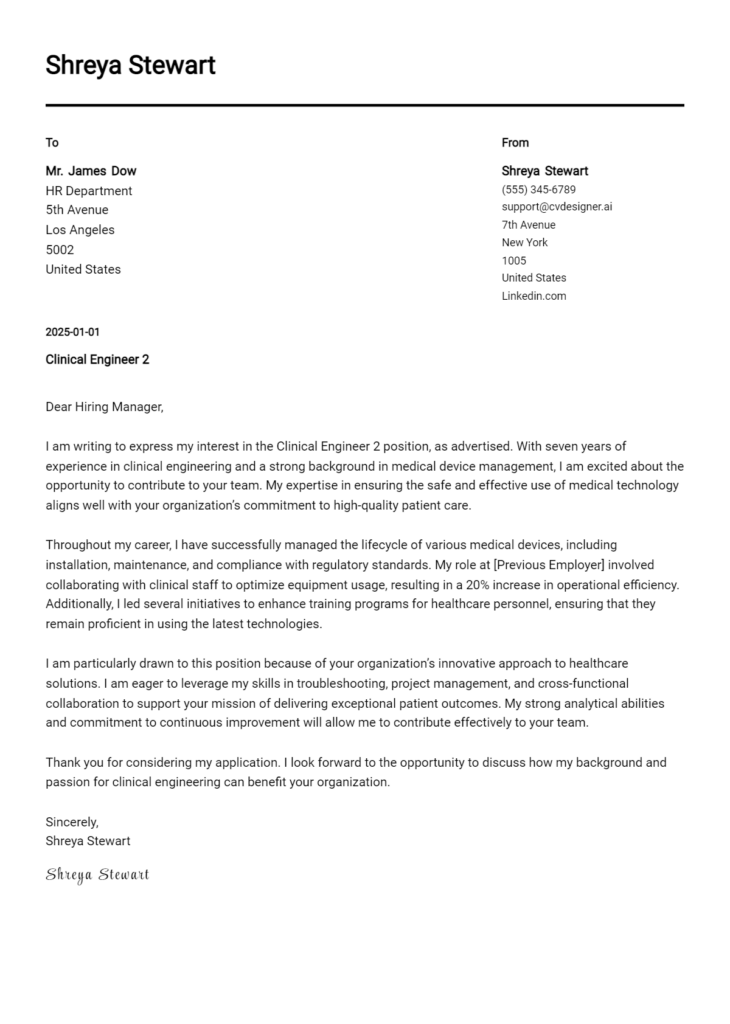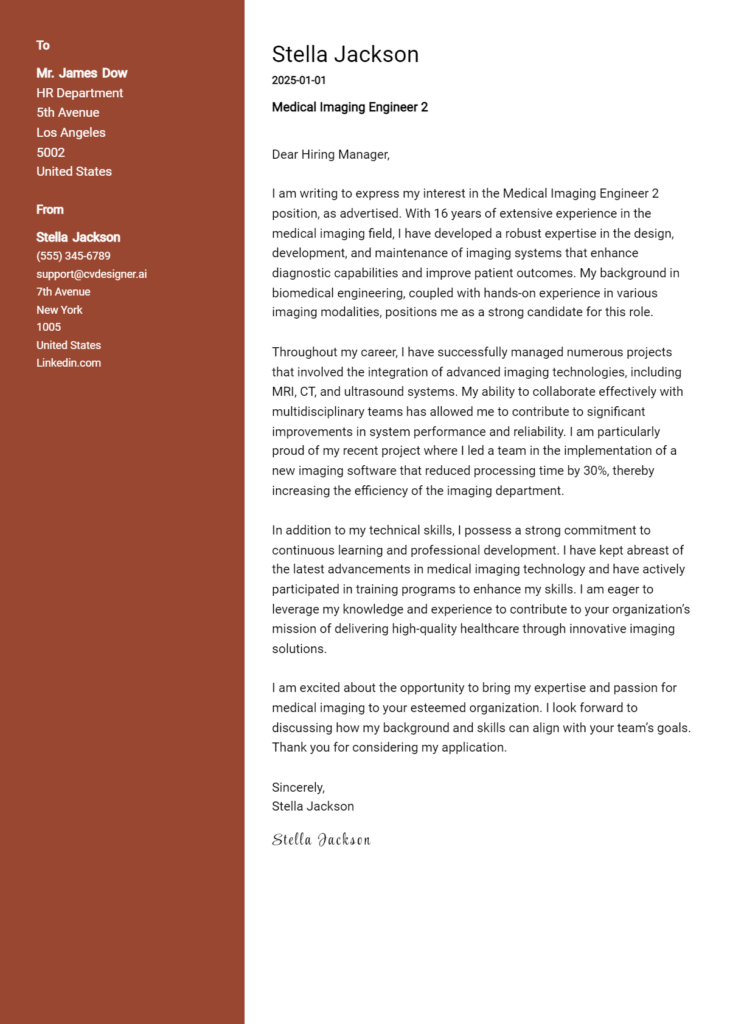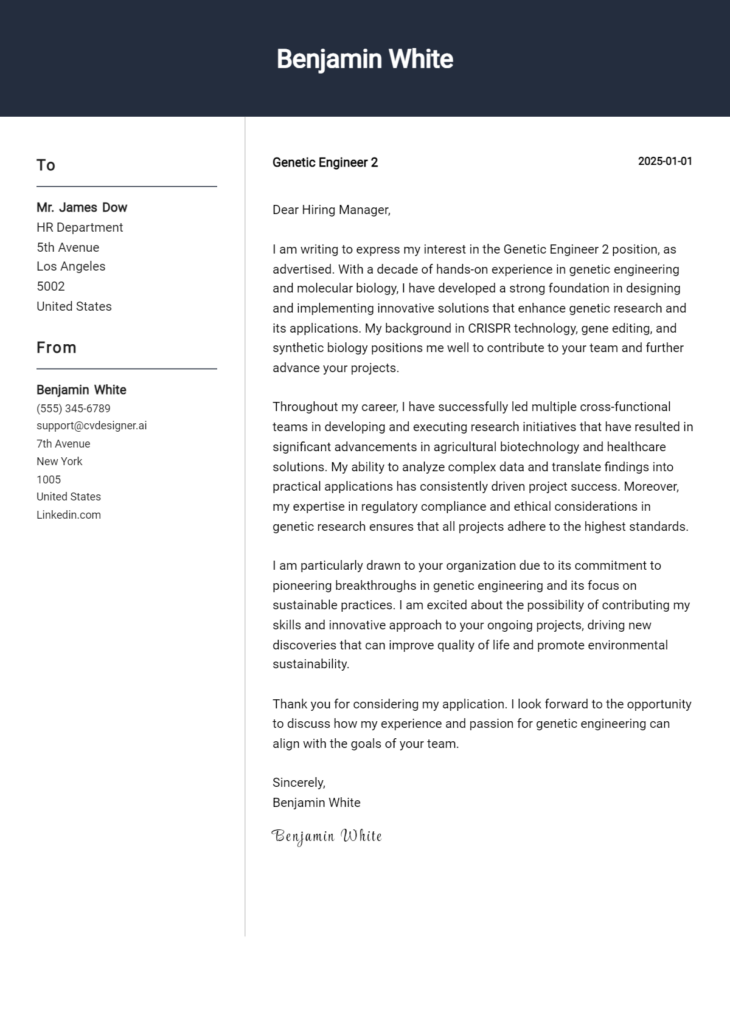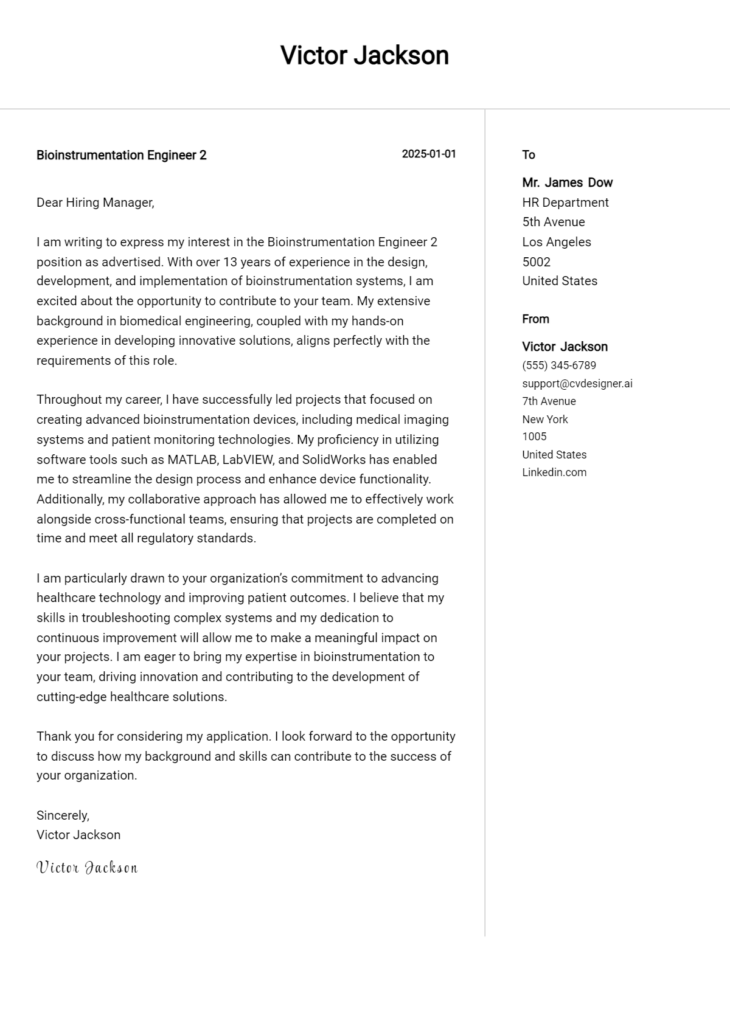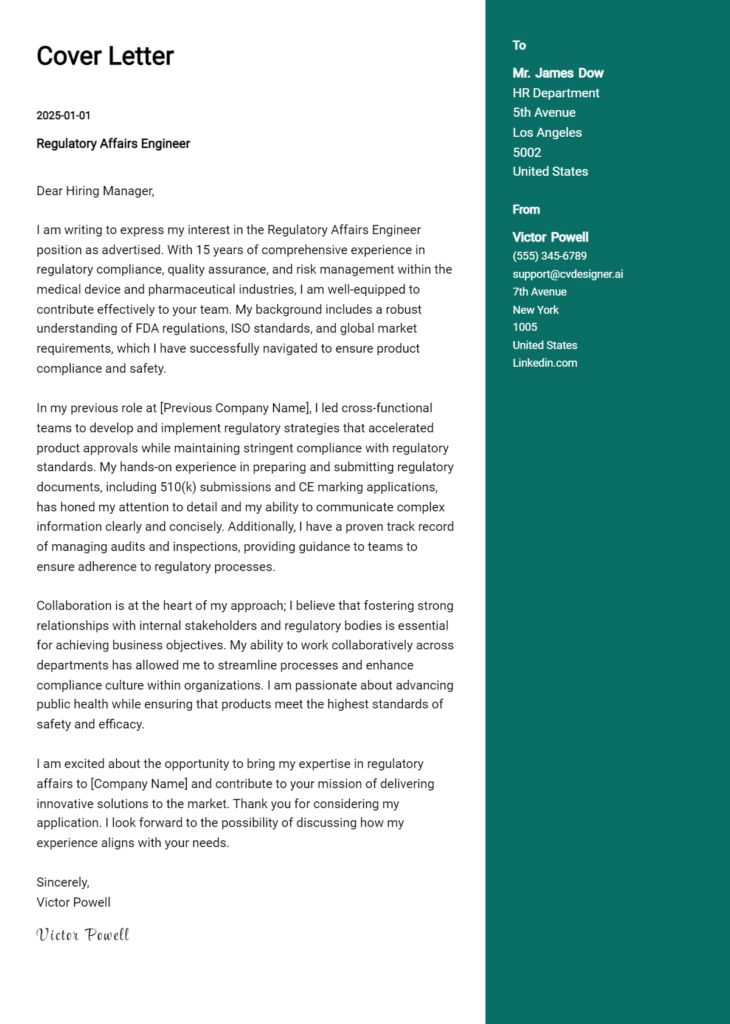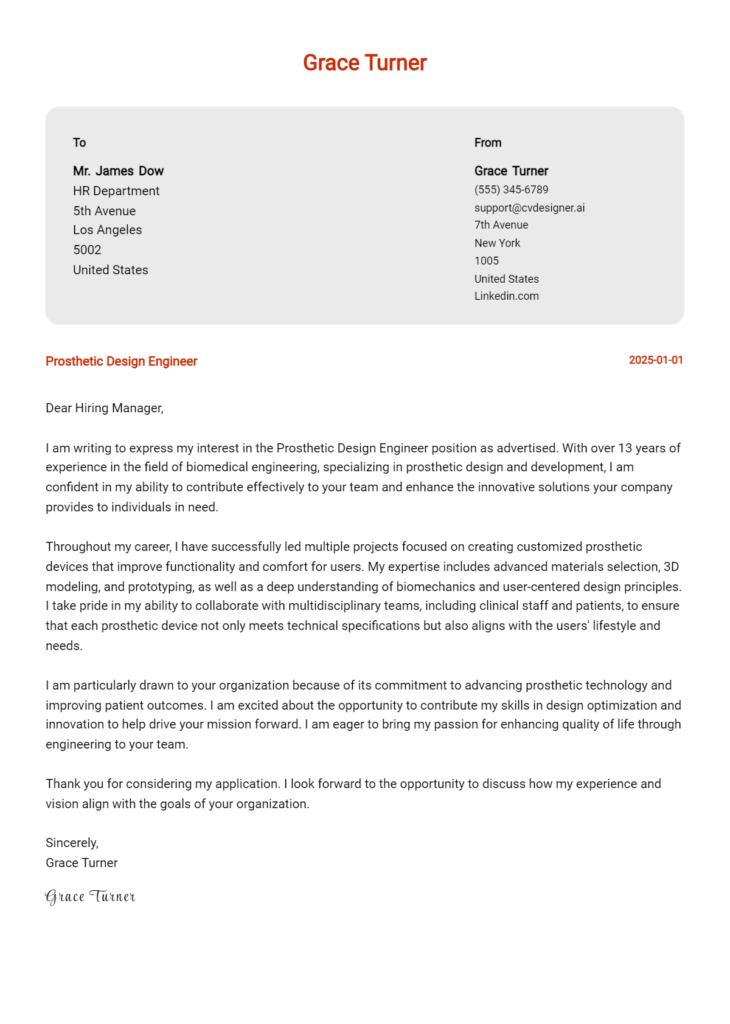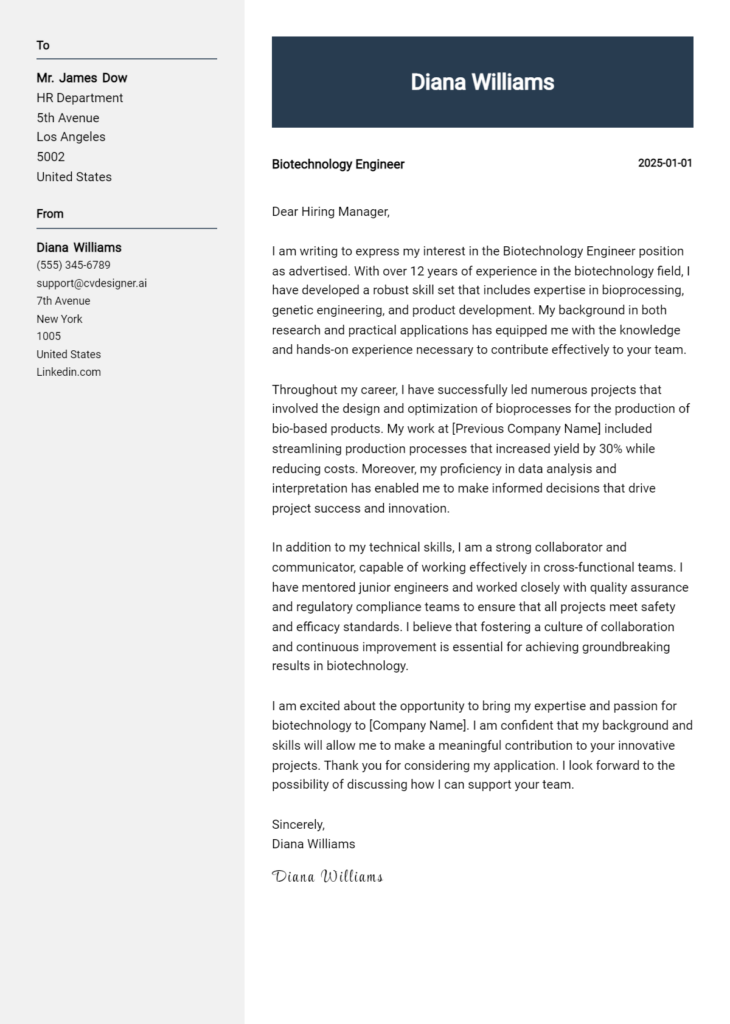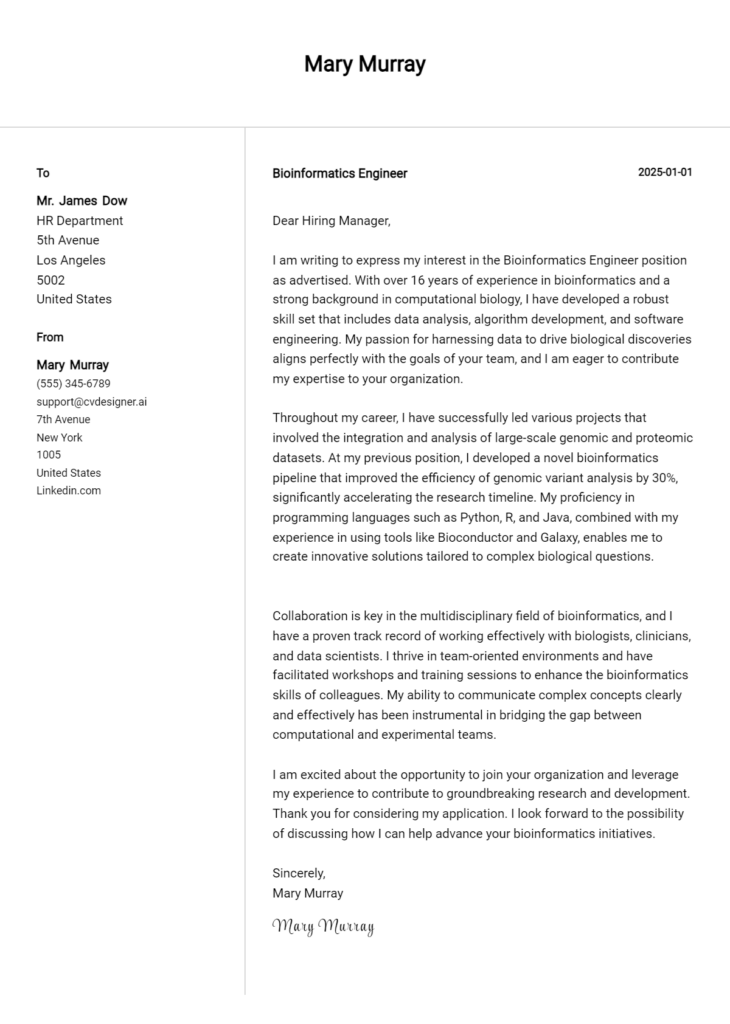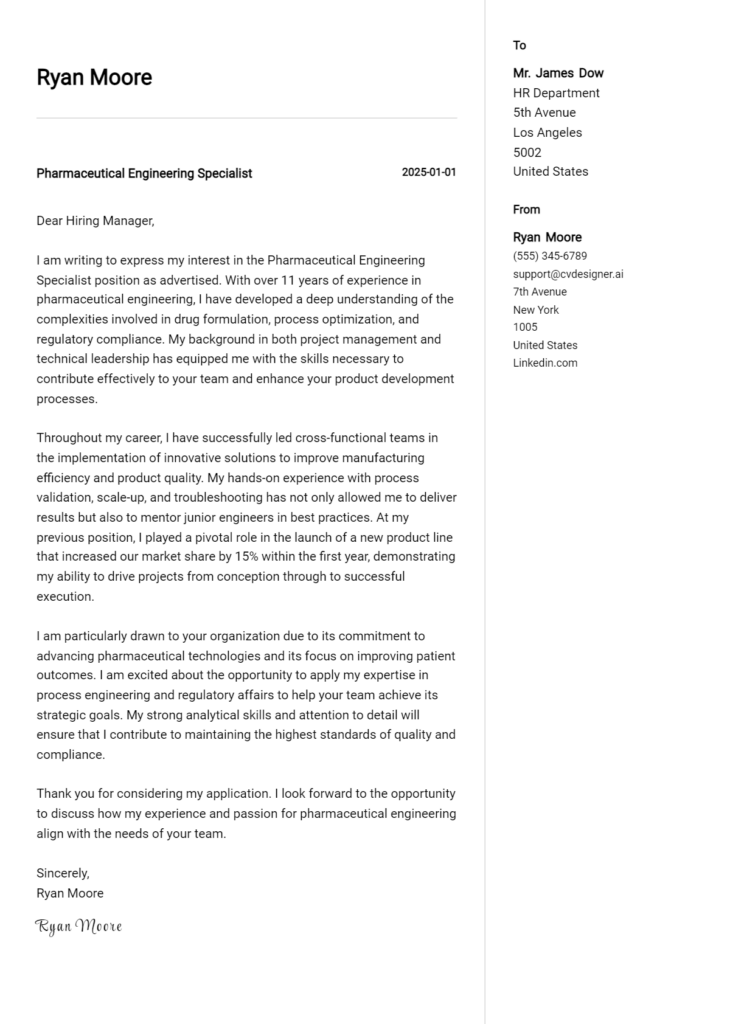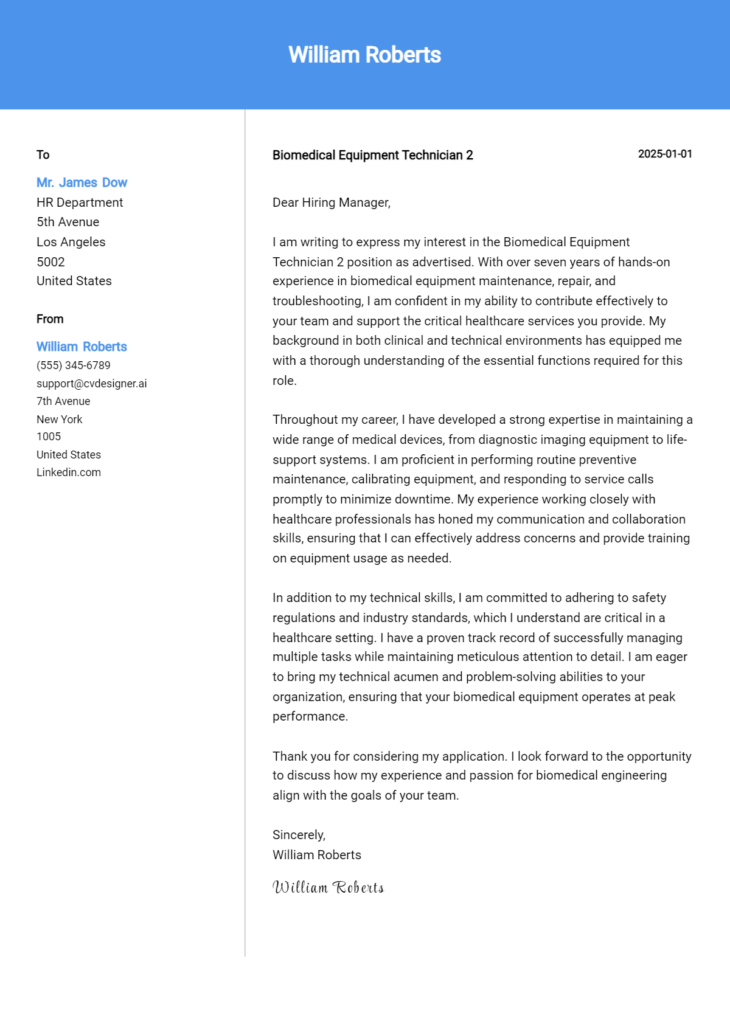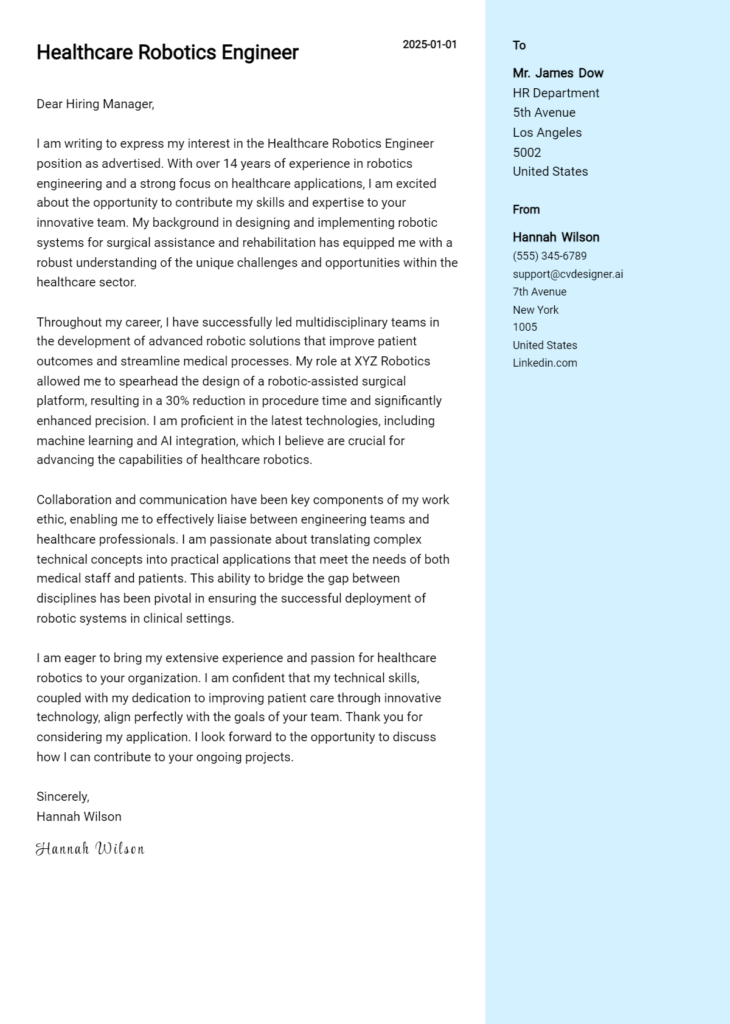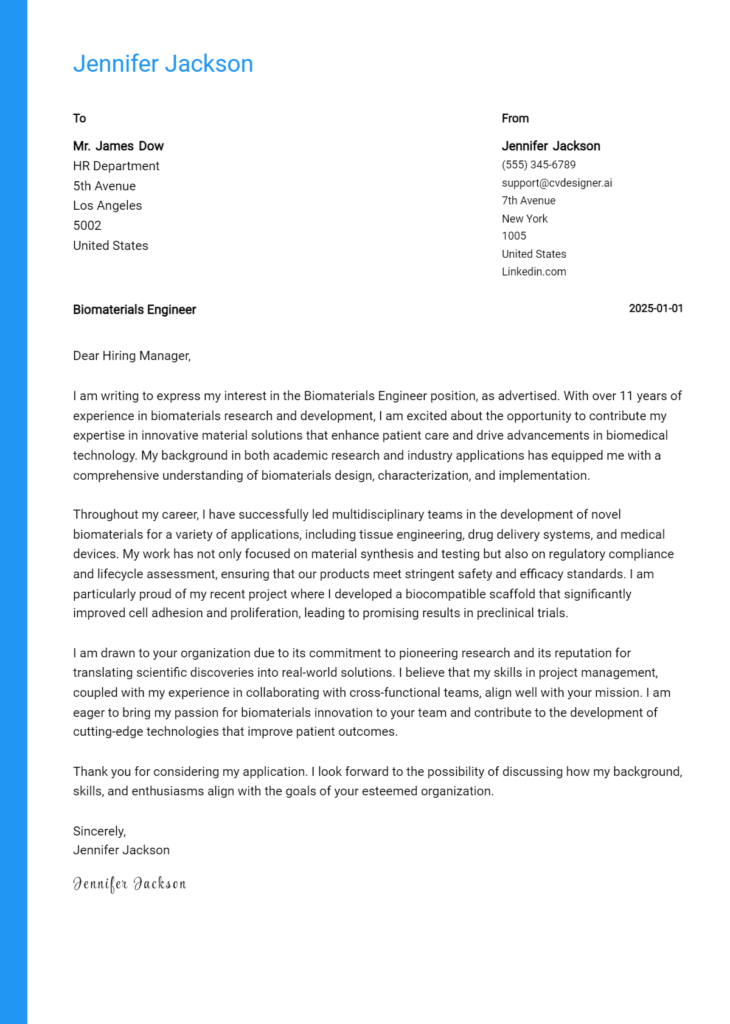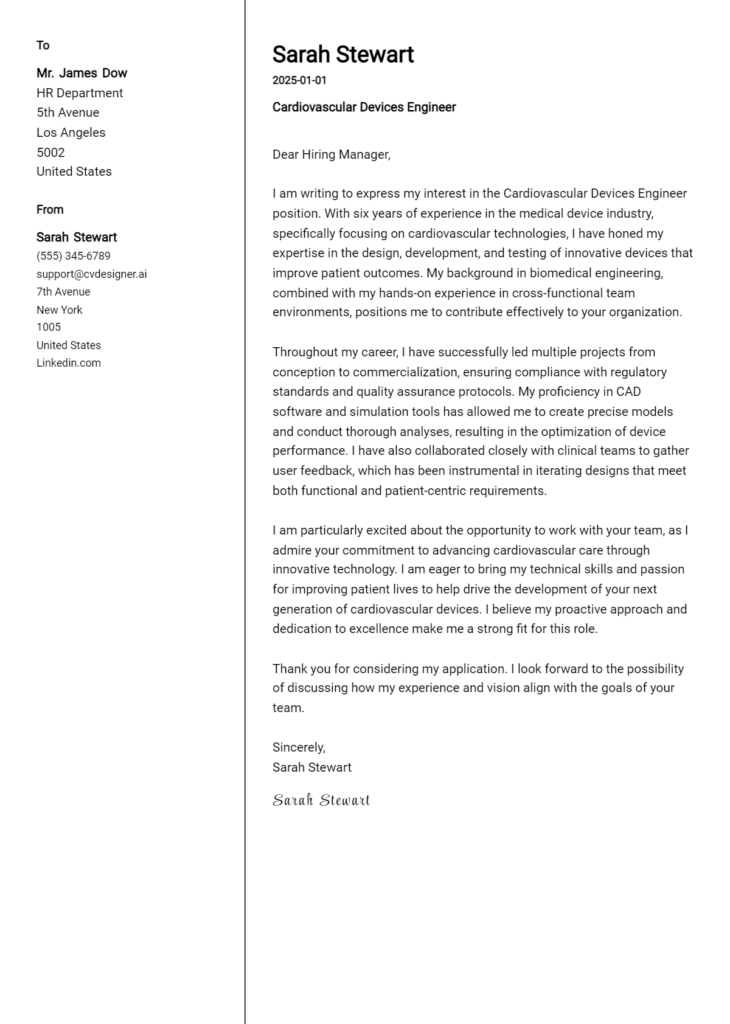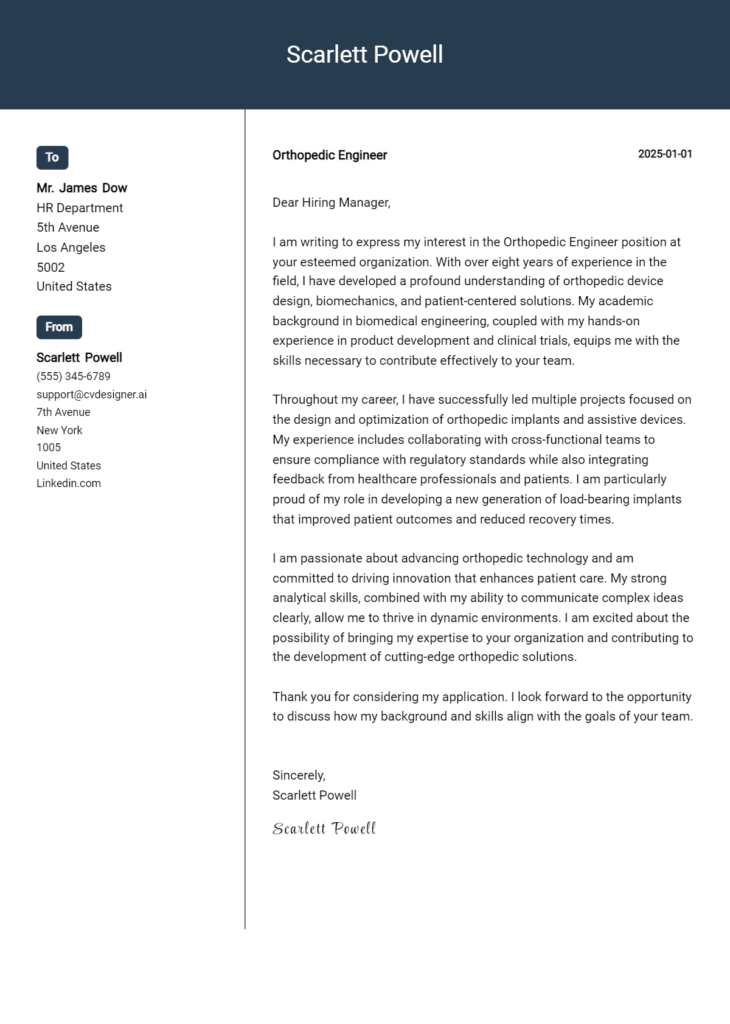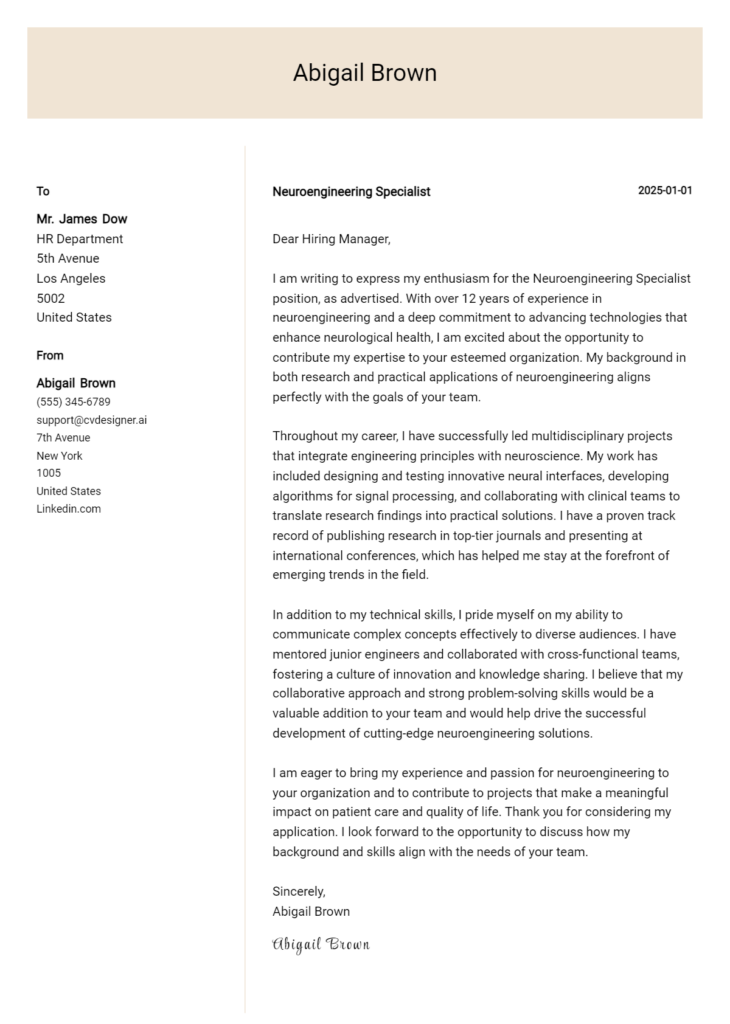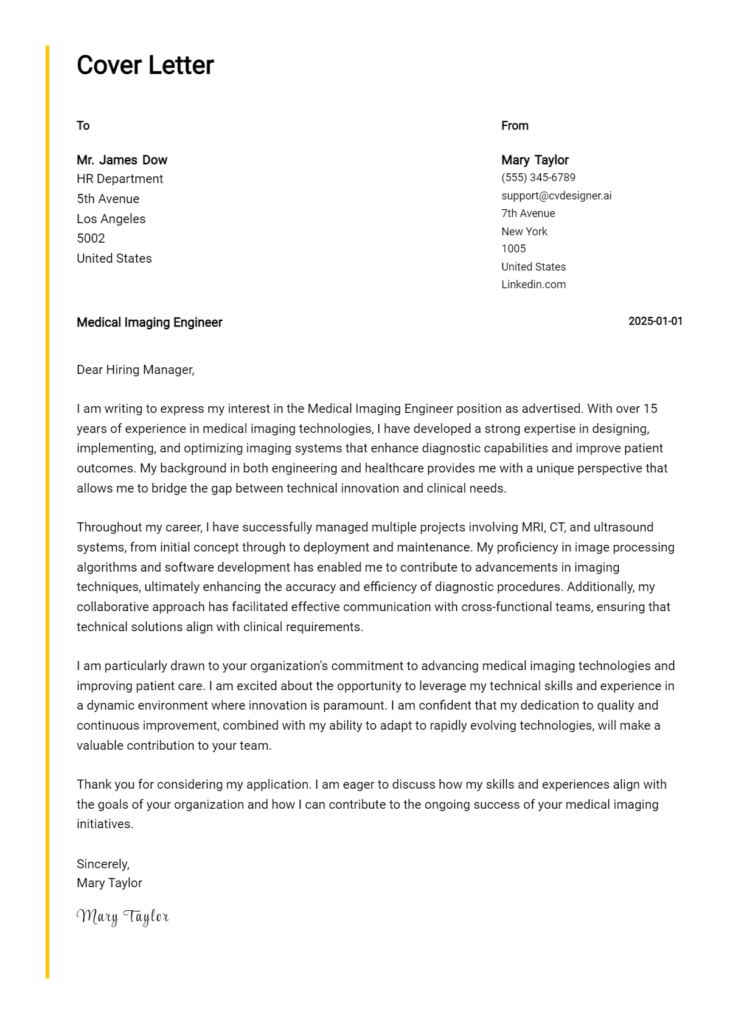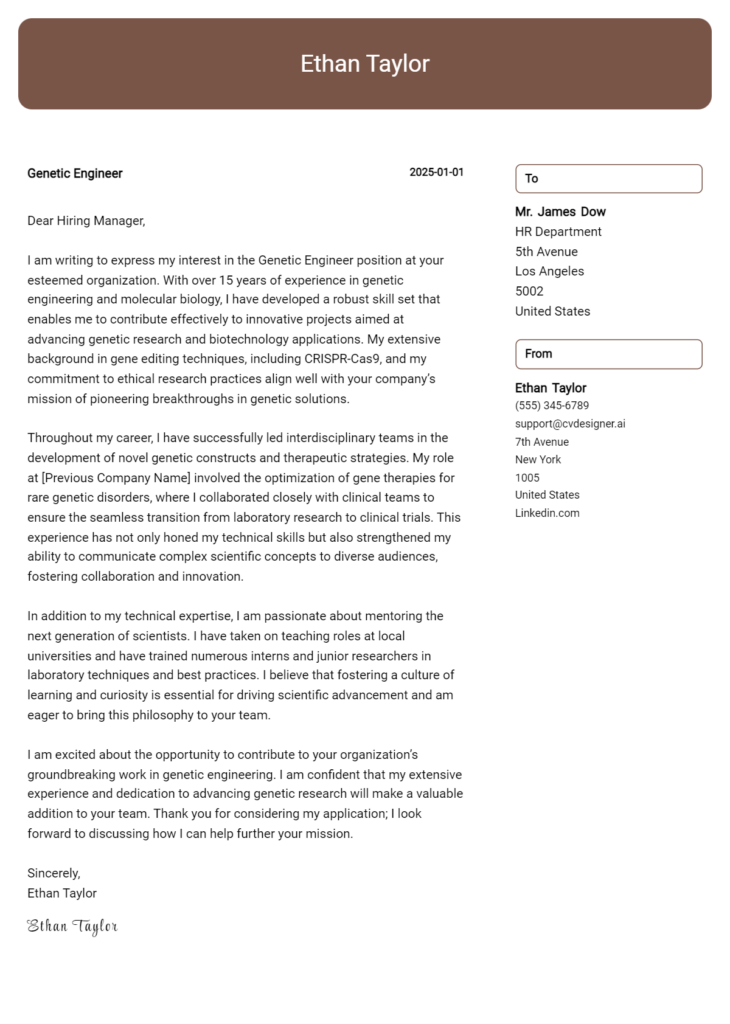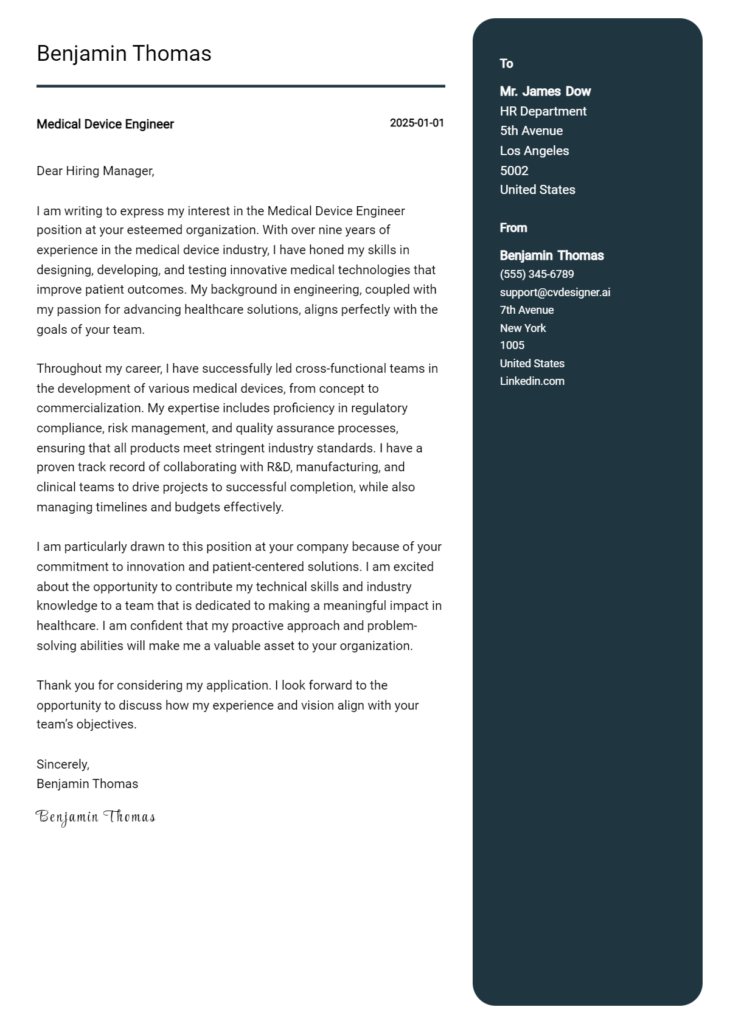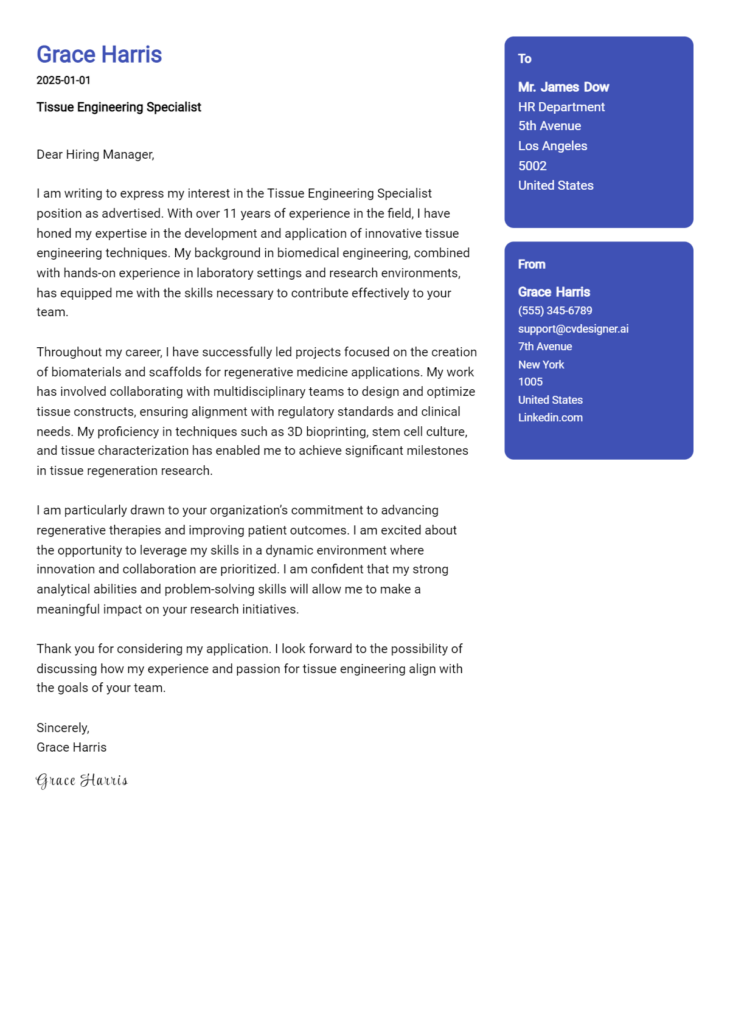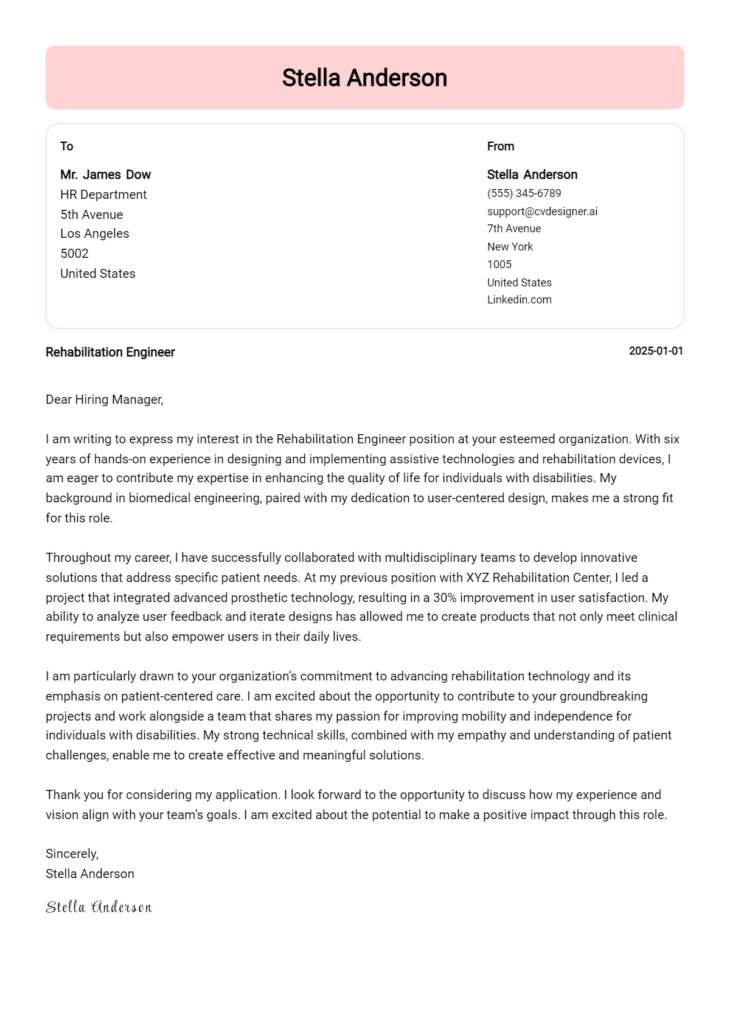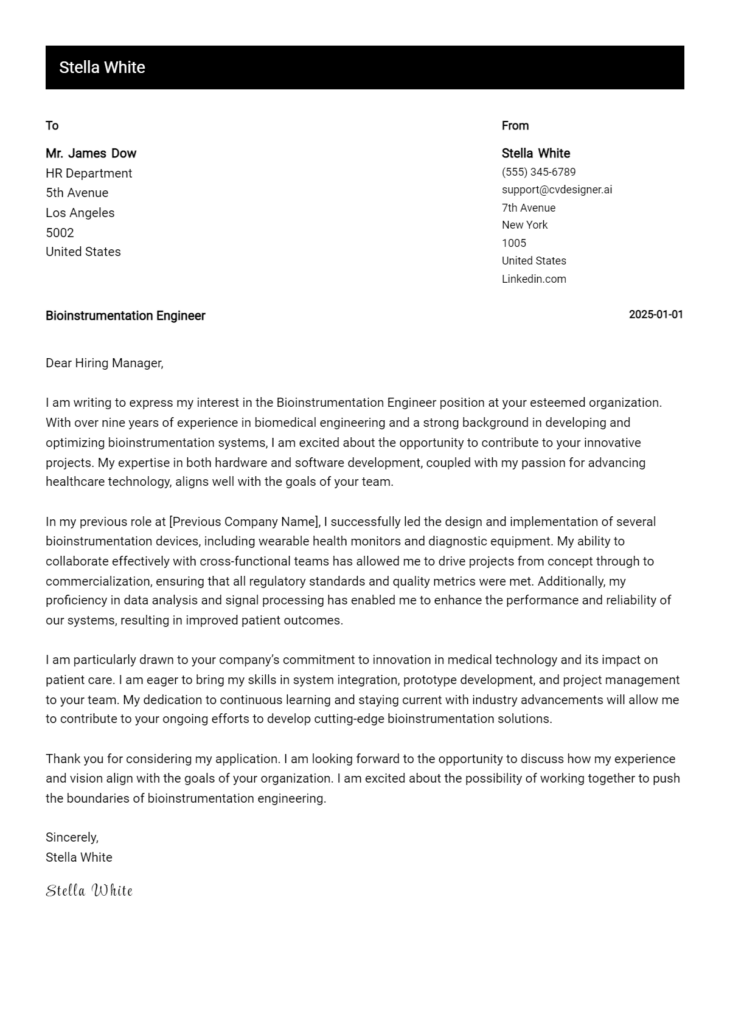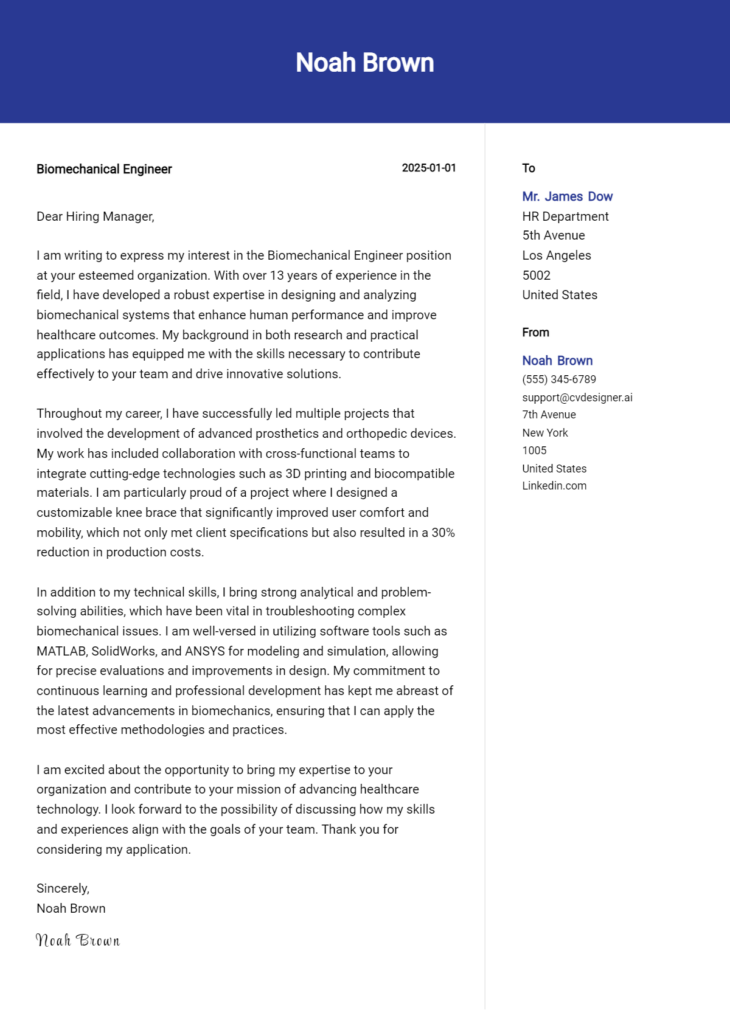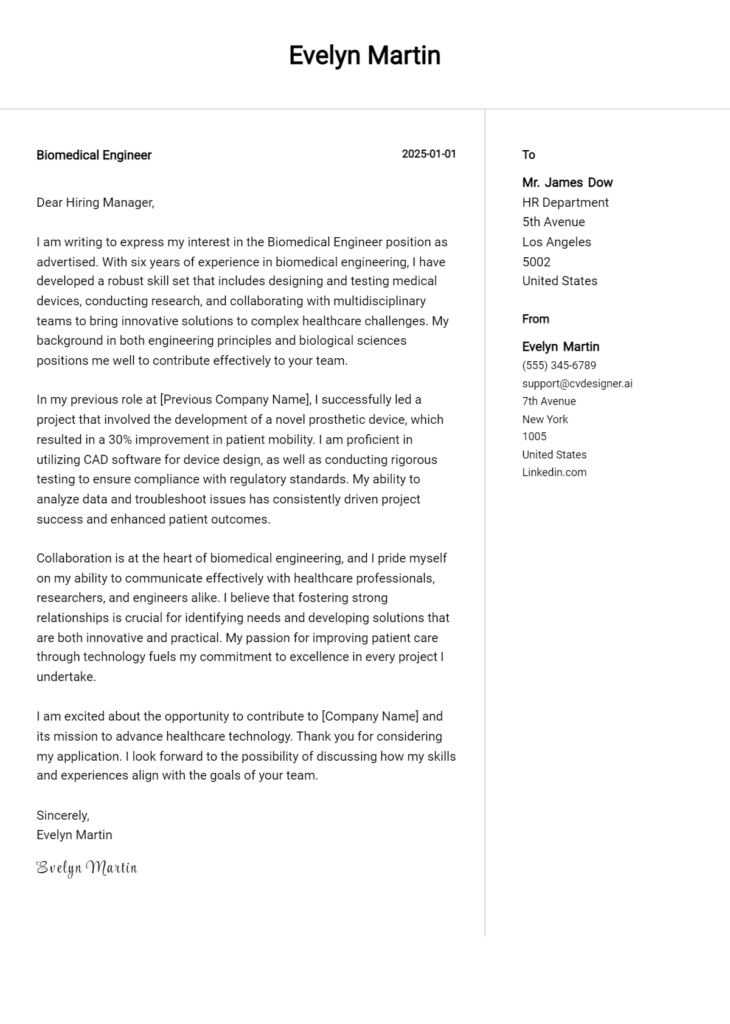Clinical Engineer Cover Letter Examples
Explore additional Clinical Engineer cover letter samples and guides and see what works for your level of experience or role.
How to Format a Clinical Engineer Cover Letter?
Crafting a compelling cover letter is essential for a Clinical Engineer, as it serves as your first opportunity to make a strong impression on potential employers. The formatting of your cover letter not only demonstrates your professionalism but also emphasizes your technical expertise and attention to detail—qualities that are paramount in the healthcare technology field. A well-structured cover letter can effectively convey your unique qualifications and enthusiasm for the role, setting you apart from other candidates.
In this guide, we will explore how to structure your clinical engineer cover letter, along with insights and examples tailored for this specialized field.
We’ll focus on the essential components of a professional cover letter, including:
- Cover Letter Header
- Cover Letter Greeting
- Cover Letter Introduction
- Cover Letter Body
- Cover Letter Closing
Each section is crucial in showcasing your qualifications and dedication to the profession. Let’s break down each part and explain how to make your clinical engineer cover letter shine.
Importance of the Cover Letter Header for a Clinical Engineer
A well-structured cover letter header is essential for a Clinical Engineer as it sets the tone for professionalism and clarity right from the start. The header should include vital information such as your contact details, the date, and the recipient's details. This not only helps the hiring manager identify who you are and how to reach you but also demonstrates your attention to detail and organizational skills—qualities that are crucial in the healthcare technology field. An effective header can make a strong first impression, while a poorly formatted one could detract from the overall impact of your application.
Strong Example
John Doe 123 Engineering Way City, State, ZIP john.doe@email.com (123) 456-7890 October 1, 2023 Jane Smith Hiring Manager Healthcare Innovations Inc. 456 Medical Dr. City, State, ZIP
Weak Example
john doe 123 engineering way city, state zip john.doe@email.com 10/1/23 jane smith hiring manager healthcare innovations inc
The Importance of a Cover Letter Greeting for a Clinical Engineer
The greeting of a cover letter is a crucial element that sets the tone for the entire document. It serves as the first point of contact between you and the hiring manager, making it essential to convey professionalism and personalization right from the start. By addressing the hiring manager directly, you show that you have taken the time to research the company and its team, which can help create a positive impression. Avoiding generic greetings, such as "To Whom It May Concern," demonstrates a genuine interest in the position and respect for the individual reviewing your application. If you are unsure of the recipient's name, a bit of research can often reveal the appropriate person to address, enhancing the personal connection.
Strong Example
Dear Dr. Smith,
Weak Example
To Whom It May Concern,
The Importance of a Strong Cover Letter Introduction for a Clinical Engineer
A well-crafted cover letter introduction is crucial for a Clinical Engineer as it serves as the first impression to the hiring manager. This pivotal section should not only capture attention but also express the candidate’s genuine interest in the role and briefly highlight key skills or achievements that align with the position. An engaging introduction can set the tone for the rest of the letter, making it essential to strike the right balance between professionalism and enthusiasm. Below are examples of both strong and weak cover letter introductions for a Clinical Engineer role.
Strong Example
Dear [Hiring Manager's Name], I am excited to apply for the Clinical Engineer position at [Company Name], where I can leverage my extensive experience in medical device technology and my passion for improving patient outcomes. With a proven track record of collaborating with cross-functional teams to optimize equipment performance and ensure compliance with regulatory standards, I am eager to contribute my skills and innovative solutions to your esteemed organization.
Weak Example
To whom it may concern, I am writing to apply for the Clinical Engineer job. I have some experience in the field and I am looking for a new opportunity. I think I could be a good fit for your company.
Purpose of the Cover Letter Body for a Clinical Engineer
The cover letter body for a Clinical Engineer serves as a crucial platform to highlight the candidate's specialized skills, relevant experiences, and the unique value they can bring to the organization. This section should effectively communicate the candidate's technical expertise, problem-solving abilities, and successful project outcomes that align with the needs of the healthcare facility. By detailing specific projects—such as the implementation of a new biomedical device, successful maintenance of critical medical equipment, or contributions to safety protocols—the candidate can demonstrate their capabilities and impact in a clinical setting. This not only reinforces their qualifications but also illustrates how they can contribute to the company's mission of enhancing patient care and operational efficiency.
Strong Example
Dear Hiring Manager, I am writing to express my interest in the Clinical Engineer position at XYZ Hospital. With over five years of experience in managing biomedical equipment and a proven track record of successful project implementations, I am confident in my ability to contribute effectively to your team. One of my notable achievements was leading a project that upgraded our hospital's imaging systems, resulting in a 20% increase in operational efficiency and a significant reduction in patient wait times. Additionally, I developed a comprehensive training program for staff on the use of new equipment, which improved compliance with safety regulations by 30%. I am eager to bring my technical skills and passion for patient-centered care to XYZ Hospital. Sincerely, John Doe
Weak Example
Dear Hiring Manager, I am interested in the Clinical Engineer position at your hospital. I have worked in healthcare for a few years and know about medical devices. I once helped fix some equipment, and I think I could do a good job at your place. I like working with teams and believe I can help out. Best, John Doe
Importance of the Cover Letter Closing for a Clinical Engineer
The cover letter closing for a Clinical Engineer is crucial as it provides a final opportunity to summarize your qualifications, express enthusiasm for the role, and encourage the hiring manager to take the next steps. A strong closing can leave a lasting impression, making it clear that you are not only qualified but also genuinely interested in contributing to the organization. Conversely, a weak closing may fail to convey your passion or leave the employer unsure about your candidacy.
Strong Example
Thank you for considering my application for the Clinical Engineer position. With my extensive background in biomedical engineering and hands-on experience in managing medical equipment, I am confident in my ability to contribute effectively to your team. I am excited about the opportunity to bring my skills to your esteemed organization and help enhance patient care through innovative technology. I look forward to the possibility of discussing my application further and hope to schedule an interview soon to explore how I can add value to your team. Please find my resume attached for your review.
Weak Example
Thanks for looking at my cover letter. I think I would be okay at this job. If you want to talk to me, that would be fine. My resume is attached.
These tips are designed to help candidates create an impactful cover letter for a Clinical Engineer position. A well-crafted cover letter is crucial for showcasing your technical skills, problem-solving abilities, knowledge of the Software Development Life Cycle (SDLC), teamwork capabilities, and a commitment to continuous learning. By emphasizing these attributes, you can demonstrate your fit for the role and make a strong impression on potential employers.
Tips for Writing an Effective Cover Letter for a Clinical Engineer
Highlight Technical Skills: Begin your cover letter by mentioning specific technical skills relevant to clinical engineering, such as proficiency in medical device software, hardware integration, or regulatory compliance. Use examples from past experiences to illustrate how these skills contributed to successful projects, emphasizing the impact of your technical expertise.
Demonstrate Problem-Solving Abilities: Clinical Engineers often face complex challenges that require innovative solutions. In your cover letter, include a brief narrative about a specific problem you encountered in your previous roles and how you approached it. Detail the steps you took, the rationale behind your decisions, and the successful outcome of your efforts.
Showcase SDLC Knowledge: Employers value candidates who understand the Software Development Life Cycle. Mention any experience you have with SDLC phases, such as requirements gathering, design, implementation, testing, and maintenance. Describe your role in these processes and how your contributions improved project efficiency or product quality.
Emphasize Teamwork and Collaboration: Clinical engineering often involves working with multidisciplinary teams. Highlight your ability to collaborate effectively with engineers, physicians, and healthcare staff. Share examples of how you contributed to team goals, resolved conflicts, or facilitated communication among team members to achieve project milestones.
Express a Passion for Continuous Learning: The field of clinical engineering is constantly evolving, making it essential to stay updated with the latest technologies and regulations. Convey your enthusiasm for continuous professional development by mentioning relevant certifications, training programs, or conferences you've attended. This demonstrates your commitment to growing in your field and adapting to new challenges.
By incorporating these strategies into your cover letter, you can create a compelling narrative that resonates with hiring managers. For added support, consider using cover letter templates or a cover letter builder to streamline your writing process and ensure a professional presentation.
Common Mistakes to Avoid in a Clinical Engineer Cover Letter
Crafting an effective cover letter is essential for standing out in the competitive field of clinical engineering. Avoiding common mistakes can significantly enhance your chances of making a positive impression on potential employers. Here are some pitfalls to steer clear of:
Generic Content: Using a one-size-fits-all cover letter can make you appear disinterested. Tailor your letter to the specific job and organization by highlighting relevant skills and experiences.
Lack of Specificity: Failing to mention specific projects or technologies you've worked with can weaken your application. Be precise about your experiences that relate directly to the job description.
Ignoring Formatting Guidelines: Not adhering to proper cover letter format can make your letter look unprofessional. Follow standard formatting rules to ensure clarity and readability.
Overly Complex Language: Using jargon or overly technical language can alienate the reader. Aim for clear and concise language that conveys your expertise without overwhelming the hiring manager.
Neglecting to Proofread: Spelling or grammatical errors can undermine your professionalism. Take the time to proofread your letter or have someone else review it before submission.
Focusing on Duties Instead of Achievements: Simply listing job responsibilities doesn’t showcase your impact. Highlight your accomplishments and how they benefited past employers.
Missing a Call to Action: Failing to express your eagerness for an interview can result in a lack of follow-up. Clearly state your interest in discussing the position further.
To see examples of effective letters and gain additional insights, check out these cover letter examples. By avoiding these common mistakes, you can craft a compelling cover letter that effectively communicates your qualifications as a clinical engineer.
Cover Letter FAQs for Clinical Engineer
What should I include in my cover letter for a Clinical Engineer position?
In your cover letter, you should include your relevant educational background, such as a degree in biomedical engineering or a related field. Highlight specific experiences that showcase your technical skills, such as familiarity with medical devices, regulatory compliance, and maintenance protocols. Mention any certifications you hold, such as Certified Clinical Engineer (CCE). It's also essential to express your passion for improving patient care through technology and your ability to collaborate with healthcare teams. Finally, personalize the letter by addressing it to the hiring manager and referencing the specific job posting to demonstrate your interest.
How can I showcase my technical skills in my cover letter?
To effectively showcase your technical skills in your cover letter, use specific examples from your work experience. Discuss projects where you successfully implemented or managed medical equipment, detailing the technologies you used and the outcomes achieved. Describe your familiarity with industry standards and regulations, such as ISO 13485 or FDA guidelines. If you have experience with troubleshooting or training staff on medical devices, mention these to highlight your hands-on expertise. Quantify your achievements where possible, such as improvements in efficiency or cost savings, to provide concrete evidence of your capabilities.
How do I demonstrate my knowledge of the healthcare industry in my cover letter?
Demonstrating your knowledge of the healthcare industry in your cover letter involves referencing current trends, challenges, and technologies relevant to clinical engineering. Discuss your understanding of how medical devices impact patient care and how you can contribute to improving outcomes. Mention any experience you have working directly with healthcare professionals or in a clinical setting. You can also address the importance of regulatory compliance and how it influences device management and safety. Incorporating terminology commonly used in the field shows that you are well-versed in the industry and can engage effectively with healthcare teams.
Should I include my career goals in my cover letter?
Yes, including your career goals in your cover letter can be beneficial, as it provides insight into your aspirations and how they align with the organization’s mission. Clearly articulate your short-term and long-term goals, such as advancing your expertise in medical technology or taking on leadership roles in clinical engineering. Make sure to connect these goals with the position you are applying for, explaining how the role will help you achieve them while contributing to the company’s objectives. This shows prospective employers that you are not only focused on personal growth but are also committed to the organization’s success.
Build your Cover Letter in minutes
Use an AI-powered cover letter builder and have your letter done in 5 minutes. Just select your template and our software will guide you through the process.

